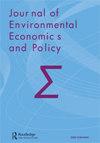Does religion promote pro-environmental behaviour? A cross-country investigation
IF 1.2
Q3 ENVIRONMENTAL STUDIES
Journal of Environmental Economics and Policy
Pub Date : 2020-07-28
DOI:10.1080/21606544.2020.1796820
引用次数: 16
Abstract
ABSTRACT Religion is one of the most prominent social institutions in the world and is profoundly entangled with day to day activities of the majority of the population. However, the effect of religion on socio-economic and environmental dimensions of development is not yet well explored in literature. Thus, this study aims to investigate the influence of multiple indicators of religion on pro-environmental behaviour and attitudes, and whether its effect varies across different income categories of countries. To this end, we use the World Value Survey data from up to 212,995 respondents across 91 countries collected from 1989 to 2014. The results of the study show that religion induces pro-environmental behaviour. Religion promotes individuals' willingness to contribute money and dampens individuals' protest against contributing for environmental protection. Similarly, religion has a positive effect on ecological donation and participation in the environmental demonstration. Furthermore, the results of this study indicate that the effects of some of the religious indicators on stated willingness to contribute for environmental protection are more pronounced in low-income countries than countries in high-income categories. These results highlight the importance of religion on environmental protection and suggest that integrating religion into environmental policies and programs may yield better environmental outcomes.宗教是否促进环保行为?跨国调查
宗教是世界上最重要的社会机构之一,与大多数人的日常活动密切相关。然而,宗教对发展的社会经济和环境方面的影响尚未在文献中得到很好的探讨。因此,本研究旨在探讨宗教的多个指标对亲环境行为和态度的影响,以及其影响是否因不同收入类别的国家而异。为此,我们使用了1989年至2014年从91个国家收集的多达212,995名受访者的世界价值调查数据。研究结果表明,宗教会诱发亲环境行为。宗教促进了个人捐款的意愿,抑制了个人反对为环境保护捐款的抗议。同样,宗教对生态捐赠和参与环境示威也有积极的影响。此外,本研究的结果表明,一些宗教指标对环境保护意愿的影响在低收入国家比高收入国家更为明显。这些结果突出了宗教对环境保护的重要性,并表明将宗教纳入环境政策和项目可能会产生更好的环境结果。
本文章由计算机程序翻译,如有差异,请以英文原文为准。
求助全文
约1分钟内获得全文
求助全文
来源期刊

Journal of Environmental Economics and Policy
ENVIRONMENTAL STUDIES-
CiteScore
4.70
自引率
7.70%
发文量
26
 求助内容:
求助内容: 应助结果提醒方式:
应助结果提醒方式:


